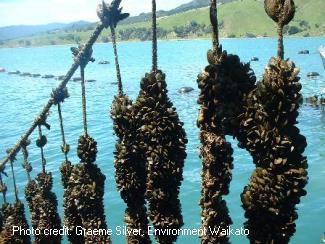
Greenshell™ mussels is the trade-mark name of farmed native green-lipped mussels (
Perna canaliculus). There are 1018 farms authorised to grow mussels in New Zealand, covering a total of around 11543 ha (as of March 2009).
In 2008, New Zealand Greenshell™ mussel exports rose to $204.25 million – a value increase of 17 % over 2007. The value increase was in spite of a 9 % decline in volume (33,300 tonnes in 2008 vs 36,160 tonnes in 2007). Greenshell™ mussels continue to be New Zealand's biggest aquaculture business and the largest (by value) single species of seafood exported today.
The main Greenshell™ mussel farming areas are in the top of the South Island (Golden and Tasman Bays, and the Marlborough Sounds) and the Coromandel (Firth of Thames). There are other smaller areas of mussel farming around New Zealand including Houhora Bay (Northland), the Hauraki Gulf (Auckland), as well as around Banks Peninsula and Stewart Island.
Greenshell™ mussels are grown by being suspended from longlines which are supported by floats in the coastal marine environment. Mussel farms are generally located in sheltered to semi-sheltered areas where there is sufficient depth of water at low tide to keep the longlines that the mussels grow on off the bottom of the seafloor.
In recent years there has been research into offshore mussel farming in exposed areas up to several kilometres from shore. Farms in these areas use longlines suspended from backbones that are anchored up to 10 m below the water surface.
At www.aquaculture.govt.nz you can learn more about ecological effects, food safety, production systems, and planning and legislation for Greenshell™ mussels.